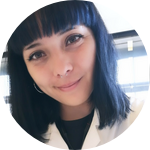About This Project
Polyethylene terephthalate (PET) can be efficiently hydrolyzed by enzymes only at high temperatures (~70ºC), whereas their degradation products can be converted into other high-value compounds by metabolically engineered microorganisms only at moderate temperatures (~30ºC). We aim to generate PET hydrolases that operate at moderate temperature to enable whole-cell biocatalysis of PET into high-value compounds, a biological recycling alternative for countries that do not produce PET polymers.
Ask the Scientists
Join The DiscussionWhat is the context of this research?
Polyethylene terephthalate (PET) represents 20% of plastics used in the packaging industry and is the main component in polyester fibers (1). While its mechanical recycling is extensively used, the polymer quality is affected in this process, leading to the discard of PET in landfills (2). PET hydrolases that degrade this plastic into its basic building blocks at 70ºC have been discovered and engineered (3), enabling its recycling and resynthesis in countries where PET is produced (4) but not in Latin America, which only accounts for 4% of resin production worldwide (5). Mesophilic bacteria have been engineered to convert the PET degradation products into higher-value aromatic compounds (6), but require the enzymatic degradation of PET at high temperature as a separate reaction.
What is the significance of this project?
Recently, PET hydrolases active at moderate temperatures (25-40ºC) have been described, but their degradation efficiency is significantly lower than the thermophilic counterparts that operate at 70ºC (3). Fortunately, recent advances in AI have led to the fast identification of amino acid substitutions that can modulate either the activity or the thermal stability of different enzymes (8, 9). Such tools could engineer novel PET hydrolases active at moderate temperatures to engineer whole-cell biocatalysts that simultaneously degrade PET and utilize its degradation products to generate high-value compounds. However, these tools have not been utilized to modulate the optimal temperature for activity of the most efficient PET hydrolases from high to moderate temperatures.
What are the goals of the project?
We aim to engineer the most efficient thermophilic PET hydrolases to operate at temperatures close to the growth temperature of bacteria (20-40ºC) using AI methods, and to test these variants both as purified enzymes and as part of whole-cell biocatalysts that produce a high-value compound based on the utilization of the degradation product terephthalate (TPA). Example activity benchmarks for both the in vitro and in vivo PET degradation and upcycling assays can be found in (10) and (6), respectively, and correspond to: (A) ~1 mM TPA release after 48 h incubation against amorphous PET powder (6, 11, 12); (B) efficient extracellular expression; (C) 100% enzyme activity retention after 10 days at 30-40ºC (13); (D) Over 785 μM high-value compound production in whole-cell biocatalysis (6).
Budget
The budget is required for buying several genes, instruments for quantification of PET degradation products, and consumables. Also, we consider 10% of institutional overhead ($5,000). The details can be found in the Solution Statement
 Project Timeline
Project Timeline
We first aim to generate variants of thermophilic PET hydrolases that operate at moderate temperatures, followed by the characterization of their performance in whole-cell biocatalysis. Lastly, the best enzymes will be incorporated into a readily developed microbial factory for the whole-cell upcycling of PET into a high-value compound. We expect for this project to be finished within the course of one year, achieving three milestones every 3-5 months
Mar 29, 2024
Characterize generated variants of thermophilic hydrolases active at moderate temperatures against PET
May 01, 2024
Submit a 6-month report of technical progress
Jun 28, 2024
Characterize extracellular expression and PET degradation rate of generated variants of thermophilic PETases in whole-cell biocatalytic assays
Nov 15, 2024
Characterize high-value compound yields obtained due to PET degradation and upcycling using whole-cell biocatalysts
Nov 15, 2024
Submit a 12-month report of technical progress
Meet the Team
Affiliates
Team Bio
The PETase team at the Protein Biophysics, Biochemistry and Bioinformatics Lab (PB3) at Pontificia Universidad Catolica de Chile works on the discovery, characterization and engineering of novel PET-degrading enzymes that operate at varying optimal temperatures. Together, we have identified and described 3 natural enzymes that degrade PET at moderate (25ºC) (1) and high temperatures (70ºC) (2), and also successfully engineered their activity (3), using computational and experimental approaches.
Cesar A. Ramirez-Sarmiento
César A. Ramírez-Sarmiento is an Associate Professor at the Institute for Biological and Medical Engineering (IIBM) from Pontificia Universidad Católica de Chile and Adjunct Researcher at the Millenium Institute for Integrative Biology (iBio). He obtained his PhD in Molecular and Cellular Biology and Neurosciences at the University of Chile, and received doctoral training in biophysics and computational biology at the University of California San Diego. Using computational and experimental protein engineering and design tools, he currently works on the discovery, characterization, engineering, and design of bacterial enzymes that hydrolyze PET, a widely used plastic that accumulates as waste in landfills and natural environments at similar rates to its production. [Google Scholar]
Valeria Eltit-Villarroel
Im a Biochemist and in this moment Im doing a PhD in Biological and Medical Engineering at Pontificia Universidad Católica de Chile.
My research career started in the laboratory of Fungal Synthetic Biology (Larrondo's lab), working on modular modifications of the circadian clock of the model fungus Neurospora Crassa. After my undergraduate studies I worked as a research assistant for 2 years in the same lab.
Subsequently I worked as a lab manager in the Protein Biophysics, Biochemistry and Bioinformatics Lab, where we worked on two main topics; metamorphic proteins
and plastic degrading enzymes. This last topic will be the one I will focus on during my PhD.
Javiera Aviles
I am an engineer in biotechnology by training and now I am a PhD Student in Biological and Medical Engeneering.
My first steps in research were in the laboratory of physiology and biotechnology at the University of Santiago de Chile, working with Antarctic plants, then I started my way with polymerases from Antarctic samples at the Fundacion Biociencia. I have been a professor in bioreactor design for chemical engineering and biotechnology students. I collaborated in the formulation of molecular kits for pathogen detection in food (NPlex). I am currently working in the Biophysics, Biochemistry and Bioinformatics Laboratory (PB3) at the Pontificia Universidad Catolica de Chile. In my first years we worked together with ReClone for the production of open source polymerases during the SARS-CoV-2 pandemic, now I am working on PET-like plastic degrading proteins to optimize their stability and efficiency.
Aransa Griñen
I am a PhD student in Biological and Medical Engineering at the Pontificia Universidad Catolica de Chile, where I also did my undergraduate studies in Biochemistry. I am currently working as a student in the Protein Biophysics, Biochemistry and Bioinformatics lab (PB3), where I am working on the improvement of PET plastic degrading enzymes using artificial intelligence. My interests are linked to applied science with an environmental focus.
Project Backers
- 0Backers
- 100%Funded
- $55,000Total Donations
- $0Average Donation



